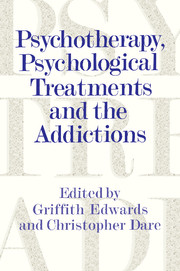Book contents
- Frontmatter
- Contents
- List of contributors
- Psychotherapy and psychological treatments of substance problems: generalism, specialism and the building of bridges
- Acknowledgements
- Part one Backgrounds to therapeutic understanding
- 1 Addictions over the life course: therapeutic implications
- 2 Psychotherapy and the life cycle: individual and family
- 3 Personal strengths and vulnerability in family and social context
- 4 Therapy in the eye of history: three episodes from the nineteenth century experience
- Part two Treatments
- Part three Postscript
- Index
4 - Therapy in the eye of history: three episodes from the nineteenth century experience
from Part one - Backgrounds to therapeutic understanding
Published online by Cambridge University Press: 05 August 2016
- Frontmatter
- Contents
- List of contributors
- Psychotherapy and psychological treatments of substance problems: generalism, specialism and the building of bridges
- Acknowledgements
- Part one Backgrounds to therapeutic understanding
- 1 Addictions over the life course: therapeutic implications
- 2 Psychotherapy and the life cycle: individual and family
- 3 Personal strengths and vulnerability in family and social context
- 4 Therapy in the eye of history: three episodes from the nineteenth century experience
- Part two Treatments
- Part three Postscript
- Index
Summary
Introduction
This book is about today's treatment of substance problems, and how, as of the minute, the generality of psychotherapeutic skills are to feed specialist activities. In this chapter we will stand back from imminent demands and examine how three episodes from nineteenth century history can speak to late twentieth century concerns. Rather as at a clinical conference, we will offer three cases for debate, but here our cases are not patients but the treatments given them.
Our first such presentation focuses on Thomas Trotter, a physician of the European Enlightenment, and what his book of 1804 may have to say about individual therapeutic processes. Next we turn to the Washingtonian movement of the 1840s, as exemplar of a non-professional and mutual help dimension in the treatment endeavour. Lastly and as our third example, we will examine developments in the last century in institutional treatment for substance problems - asylums, reformatories, and so on. The purpose is not to flatter ourselves by seeing past efforts as quaint, naive, or mistaken, nor that of drawing easy ‘lessons from history’. The proper and far more difficult business is to discern processes, continuities, break points and basic issues, and where we stand in the long view of history. As with most usefully stimulating case conferences, one may hope that people leave the room still talking, rather than their being narcotised by easy answers.
Case 1. Thomas Trotter and inebriety as a habit to be broken
At the end of the eighteenth and beginning of the nineteenth century, the idea that inebriety might be a disease rather than a sin had become commonplace among leading physicians (Porter, 1985). That concept legitimised a medical role in response to excessive drinking (Levine, 1978; Edwards, 1992). Getting drunk was no longer merely a sin to be preached against and abhorred. Thomas Trotter was an Edinburgh-trained physician (Porter, 1988), who published his Essay on Drunkenness in 1804. With admitted arbitrariness we can take that volume (Trotter, 1804) as the starting point in the modern history of the psychotherapy of substance dependence.
Trotter asserted that ‘The disease of inebriety is a habit of the mind’. He used the word ‘habit’ in a specific sense deriving from associationist psychology (itself later a source of Freudian psychoanalysis).
- Type
- Chapter
- Information
- Publisher: Cambridge University PressPrint publication year: 1996

